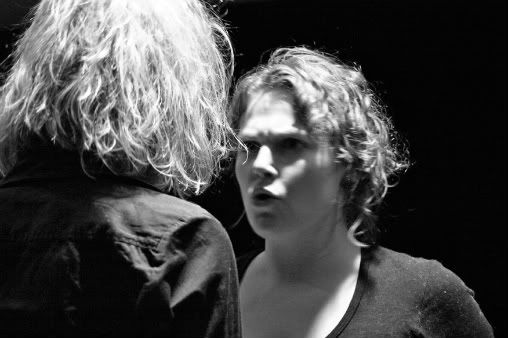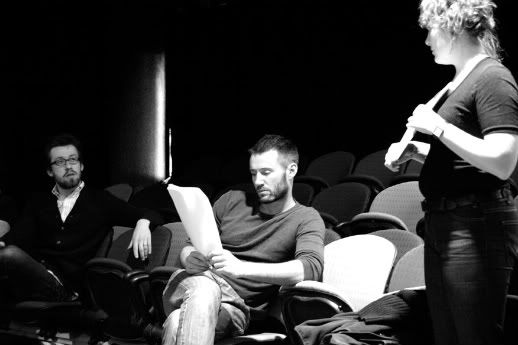S: Good play. I had a really great time, I loved the comedy, thought the acting was all quite strong and design was beautiful. There were some glorious images (flowers) and the whole thing felt pristine.
M: Pristine? Do you care to elaborate?
S: You walked into the intimate Downstairs Belvoir theatre, to the serene sound of a shower running into the stark porcelain of a claw foot bath. The bath sat atop perfectly polished floorboards. Obviously, this was the bathroom of someone successful. We soon learned that it was the home of Rita and Alfred, a well-to-do couple with a harrowing secret.
M: I’m yawning already.

S: I know right? When you dumb it down to its simplest elements, it’s a fairly conventional plot. But the story itself in fact takes many twists, and at times a dark comedy comes out moving it away from the simple story it could easily have been
M: It’s an Ibsen adaption yeah?
S: Yeah, not that I know anything about the original, which doesn’t seem to be a problem with this production as the story is quite far removed from the play that inspired it.
M: What did you like about it?
S: I’ve talked already about the comedy, which I think was one of the most striking elements of the play. I’m a great lover of awkwardness on stage, and the character of Henrik (Gareth Davies) was awkwardness personified. It was as if he was in a different play altogether, but rather than this being a problem, it in fact provided a great counter point to the heavy burden the text placed on the other characters.
M: Heavy burden you say. What burden?
S: Alfred and Rita have a child, Eyolf, who at the beginning of the play is missing. This is all the more worrying because Eyolf has a disability, one of his legs is crippled. The play begins with Rita and Alfred’s sister Asta in the bathroom discussing the incident, as well as Alfred’s impending return. It is clear from the start that Alfred and Rita’s relationship is far from harmonious. This is then compounded when Eyolf is declared dead, and we watch as Alfred falls to pieces, unable to leave the bath, let alone the bathroom. Throw into the mix Henrick, who is in love with Asta and gloriously unable to deal with people, and you have The Only Child, an hour and a half long investigation of guilt and recrimination in modern relationships
M: Did you love it? Why don’t you marry it?
S: But there’s the frustrating thing. It was so close to being marriage worthy, but it never quite got to the altar. Was this your experience? Am I being too harsh?
M: No you’re not too harsh. I thought it was great too. But I left wishing it’d been better. In the language, the content, the images, the form was such potential. But ultimately I felt like I’d seen the veneer of a show, the surface of an emotional impact. Never something as raw and painful as I was sure it would be. I think it glossed over all the nasty bits.
S: Do you mean in the text or the production?
M: Well the text was nasty as fuck. Thomas Henning and Simon Stone’s adaption of the Ibsen is a cutting look at moral collapse with a vicious wit and sly humour. So that rules out the text.
S: So it was the production then?
M: Set and lighting you mean?
S: Yeah, and the direction.
M: Direction then. All the theatrical elements made this play easier to bear. As you’ve mentioned they were gorgeous and really effective. But to the wrong end. The transition states, the ethereal images and stage pictures made the raw content disappear. I wanted to be rubbed raw by the uncomfortable truth of Alfred and Rita’s relationship, by their inadequacies mirroring my own personal failings but instead, everything was working to placate me.
S: Even the nudity, did that feel like gloss? Surely that was visceral. For those who haven’t seen it, there was a fair bit of nudity.
M: The naked bodies were beautiful first, visceral second. And this was to do with how they were framed. Despite Downstairs Belvoir being a tiny little space and even though I was two feet away from the naked actors, they seemed pictorial and not physical beings. Beautiful but, AHHH, I didn’t care. Is that fair enough, am I just insane or something. They were naked for ages why didn’t I get the sense it was raw?

S: I think you’re right, and I think it was partially to do with the beautiful framing, the warm lights shining back of the polished floor to give their bodies a sort of sheen rather than leaving them stark and grotesque. With the possible exception of Henrick’s initial forays into nudity.
M: Yeah that worked. I feel guilty for slamming it this way. Because I think it is such an achievement to make abundant nudity onstage beautiful first, it never felt tacky. Always an organic development of the staging. It was stunning really. It’s just that it didn’t serve the text in the right way. It slightly backed off from really being effective.
S: I think that was the main thing that stopped this production from being absolutely devastating, was that it backed off at all the wrongs moments. Just as I was on the edge of my seat, there was a blackout or a joke to let me off the hook. The most obvious example was when Rita joined Alfred in the bath and began to seduce him.
M: And…….blackout.
S: I was left thinking why didn’t they just have sex? It would have horrific in the wake of what had come before. But we seem to have lost sight of our interview form. Did you have a problem with the transitions?
M: Not really. I accepted the blackouts as a convention that was consistent, they weren’t overly long. It was the inbetween images and subtle shifts that annoyed me. FUCK SIMON. This is so frustrating. I loved it. I loved The Only Child. It is a confident, aesthetically assured, devastatingly performed production by a young company under the restless direction of Simon Stone. I hated The Promise. I thought this Hayloft work was awesome. BUT. It could have been so much better and all I can think about is What If? What IF? WHAT IF? This sucks.
S: I had the same problem. In the past couple of days I’ve had several conversations about the play where half way through, I realise I sound like I hated it. Which I didn’t. It’s just that it could have been one of the shows of the year, and it just didn’t quite get there.
M: Everyone should see it though yeah?
S: Absolutely. They’re one of the most important companies in Australia at the moment, and this is further of evidence of that.
M: So we keep hearing. I’m glad that this time, Hayloft and Simon Stone lived up to hype. But they could have exceeded it.
S: ARGH! I’m normally frustrated when things are bad, not when they are good.
M: ARGHHHGGGHHHHH!!!!
Simon and Mark
1 comment:
I wasn't really frustrated at all by this production. I can certainly see why you guys were, but it never bugged me. Perhaps I never saw it as something that could have approached sheer brilliance, I just thought it was really really good.
For me one of the best things about it was being able to recognise the strength of an ensemble work, that a clear intent from a group of people adept at working together could be realised. There's no way you could get a show that good without an ensemble mentality driving it. I've no problem with the 'let's get this director, and these actors, and these designers' approach, and sometime it produces some pretty great stuff, but The Only Child was solid in a way that can only be achieved through an ensemble company.
I felt really emotionally connected to the show, but in a way where I was feeling the gravity of the emotion more than the emotions themselves. I think the blackouts and whatnot that you guys mentioned contributed to this. I never felt emotionally distant, but a lot of the time I was acknowledging the grief more than sharing in it. Not that I had a problem with that, I felt it worked really well.
On the whole, one of the better plays I've seen of late. Not incredible, and I appreciate that you two felt the gap between incredible and what it was, but just really really good.
Post a Comment